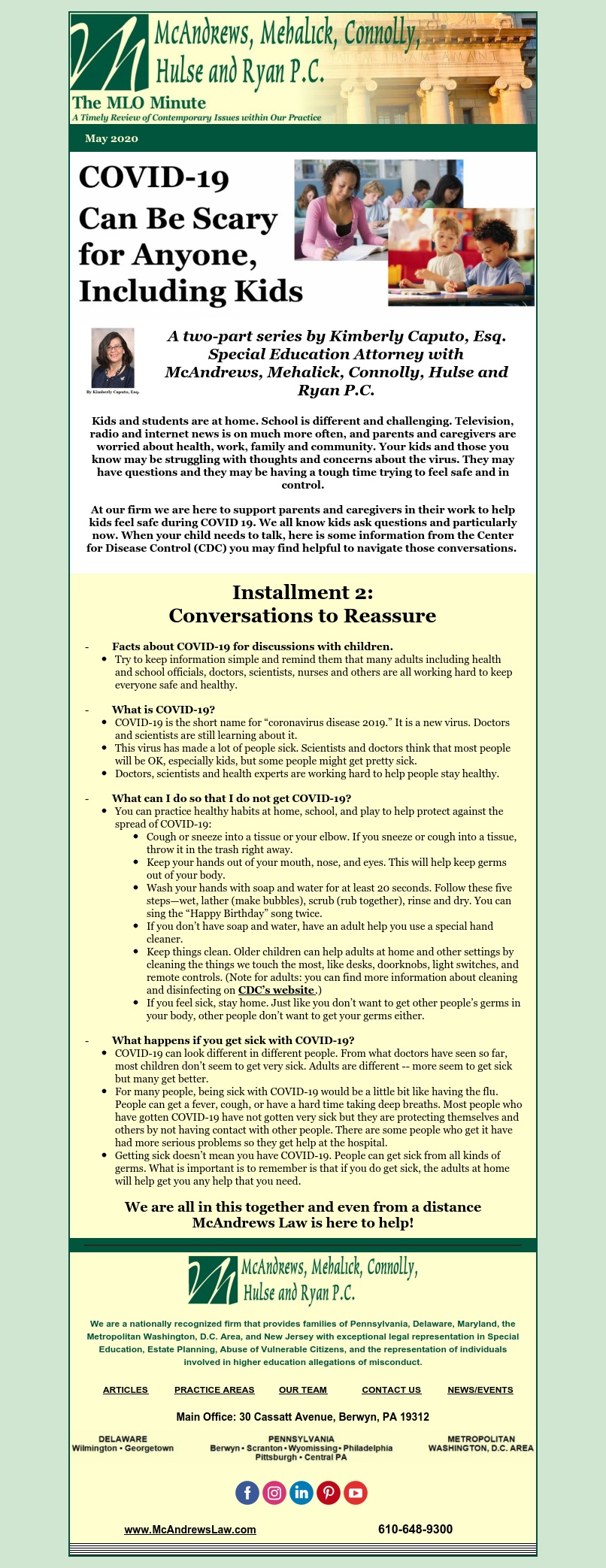May 2020
The MLO Minute: A Two-Part Series by Kimberly Caputo, Esq.
Kids and students are at home. School is different and challenging. Television, radio and internet news is on much more often, and parents and caregivers are worried about health, work, family and community. Your kids and those you know may be struggling with thoughts and concerns about the virus. They may have questions and they may be having a tough time trying to feel safe and in control.
At our firm we are here to support parents and caregivers in their work to help kids feel safe during COVID 19. We all know kids ask questions and particularly now. When your child needs to talk, here is some information from the Center for Disease Control (CDC) you may find helpful to navigate those conversations.
Installment 2:
Conversations to Reassure
Facts about COVID-19 for discussions with children.
- Try to keep information simple and remind them that many adults including health and school officials, doctors, scientists, nurses and others are all working hard to keep everyone safe and healthy.
What is COVID-19?
- COVID-19 is the short name for “coronavirus disease 2019.” It is a new virus. Doctors and scientists are still learning about it.
- This virus has made a lot of people sick. Scientists and doctors think that most people will be OK, especially kids, but some people might get pretty sick.
- Doctors, scientists and health experts are working hard to help people stay healthy.
What can I do so that I do not get COVID-19?
- You can practice healthy habits at home, school, and play to help protect against the spread of COVID-19:
- Cough or sneeze into a tissue or your elbow. If you sneeze or cough into a tissue, throw it in the trash right away.
- Keep your hands out of your mouth, nose, and eyes. This will help keep germs out of your body.
- Wash your hands with soap and water for at least 20 seconds. Follow these five steps—wet, lather (make bubbles), scrub (rub together), rinse and dry. You can sing the “Happy Birthday” song twice.
- If you don’t have soap and water, have an adult help you use a special hand cleaner.
- Keep things clean. Older children can help adults at home and other settings by cleaning the things we touch the most, like desks, doorknobs, light switches, and remote controls. (Note for adults: you can find more information about cleaning and disinfecting on CDC’s website.)
- If you feel sick, stay home. Just like you don’t want to get other people’s germs in your body, other people don’t want to get your germs either.
What happens if you get sick with COVID-19?
- COVID-19 can look different in different people. From what doctors have seen so far, most children don’t seem to get very sick. Adults are different — more seem to get sick but many get better.
- For many people, being sick with COVID-19 would be a little bit like having the flu. People can get a fever, cough, or have a hard time taking deep breaths. Most people who have gotten COVID-19 have not gotten very sick but they are protecting themselves and others by not having contact with other people. There are some people who get it have had more serious problems so they get help at the hospital.
- Getting sick doesn’t mean you have COVID-19. People can get sick from all kinds of germs. What is important is to remember is that if you do get sick, the adults at home will help get you any help that you need.
We are all in this together and even from a distance McAndrews Law is here to help!





